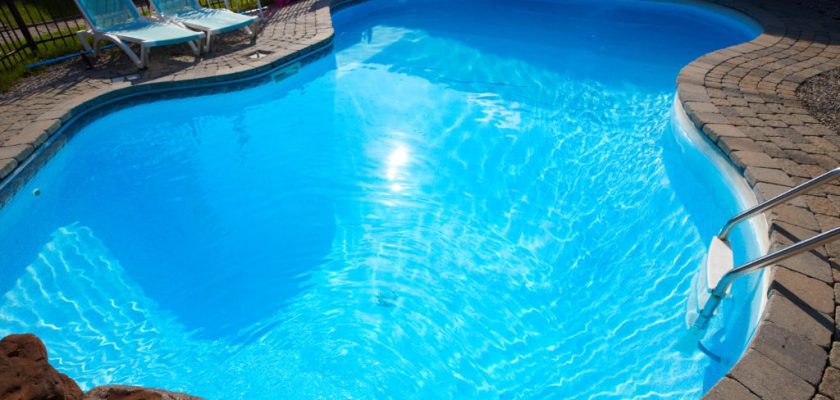Some pool symptoms can be a sign of something more than just a purification problem. If your water chemistry is not balanced, it can lead to your pool looking discolored and causing damage to equipment such as heaters, filters, and other mechanical devices that do not keep proper pH levels. A pool’s overall appearance is essential, but its water health will help ensure the safety and lifetime of your pool. Keeping your pool clean is crucial to protecting your investment.
When not properly preserved, you may have many microbiological organisms in the water of your home swimming pool, including viruses, bacteria, and protozoa. As a result, you may experience health problems such as sore throats, gastroenteritis, ear infections, and nasal infections from these microbes. Be sure to check your pool constantly in order to ensure your water is safe enough so you can swim in it.
If you notice changes like turbidity, you should consider testing the water as well as implementing measures to enhance water quality before someone goes for a swim. Below are some signs that will help you realize that your pool needs to be cleaned.
Cloudy and dirty water
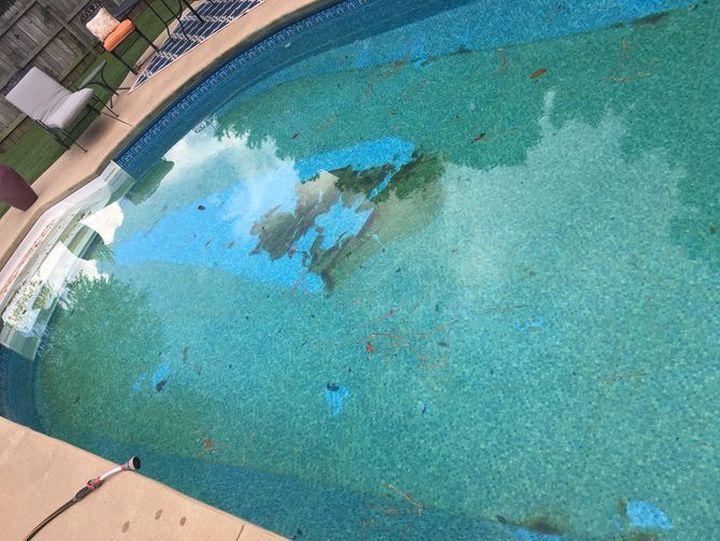
Source:pixiespetals.com
First, you should begin with something easy to identify. By staring into the pool, you can assume if you can see the ground, therefore you can conclude whether it is clean enough. However, even though this is a good sign, at the same time, it does not guarantee that your pool is 100% safe.
Whenever you see a change in the color of your swimming pool water, it indicates that something is wrong and requires further fixing. One popular sign you may notice is green-colored water, which signifies that algae have been growing all over the sides as well as the floor of your pool. However, other colors indicate the water is not in good condition apart from the green color. For example, some of the commonly encountered colors are brown and a yellow tint over water. The reason for this is the growth of algae as well as other pollutants in your pool.
Any discolorations, even the slightest, are sufficient reasons for a complete cleaning procedure before the contaminants cause additional harm to the pool equipment. When the pool has cloudy water, it may be due to a lack of sunlight, chemical imbalance, heavy rain, or a problem with your pool filter.
Heavy chlorine smell
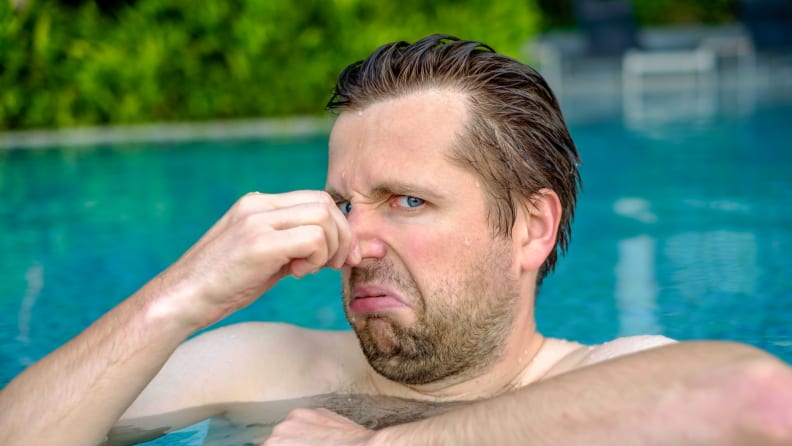
Source:reviewed.com
A heavy chlorine smell will not imply that your pool is clean and safe! When a pool is in good condition, it usually produces only a slight or no smell at all. As your pool handles too high amounts of organic material such as sweat, urine, and bacteria, the smell of chlorine will intensify. Intense chlorine odor is an indication that there is insufficient chlorine in the pool to be able to cope with all the contaminants, and it should be resolved as soon as possible before anyone gets into the water.
Bubbles and foam
The water with the ability to keep bubbles for long periods actually indicates that your water has dirt in it due to its high surface pressure. Substances present in the water like, soaps, suntan lotions, chemical imbalance, high levels of bacteria, many chemicals in the pool, as well as blocked filters, are the reason for bubbles in the water.
Feces in swimming pools
When swimming, small children may accidentally defecate from time to time. Clean the pool and use a fine-mesh shovel to get rid of as much feces as possible. As long as your pool is small, you have the option of draining and then cleaning it. In other cases, apply a concentrated 10 mg / l chlorine solution in the pool and do not permit people to return to the pool for more than half an hour. Remember that you need to ensure if the chlorine level was reduced to the standard level before allowing people back into the pool.
The slimy feeling on your skin
Soak your hands in the water or in any pool equipment in order to check if your hands feel slimy or oily. In that case, you can be sure that the chlorine added to the pool has not worked properly, and it indicates that the pool is full of bacteria.
Living organisms
One of the more obvious signs that your pool needs cleaning is the insects. Poorly cleaned pool water could often make perfect habitats for growing bacteria as well as pests like bugs, mosquitoes, and other small insects. Therefore, when you spot anything tiny that is squirming in your pool water, do not go swimming in it. You should call a pool professional service such as capitalcountrypools.com.au for further proper maintenance.
Check the chemical levels
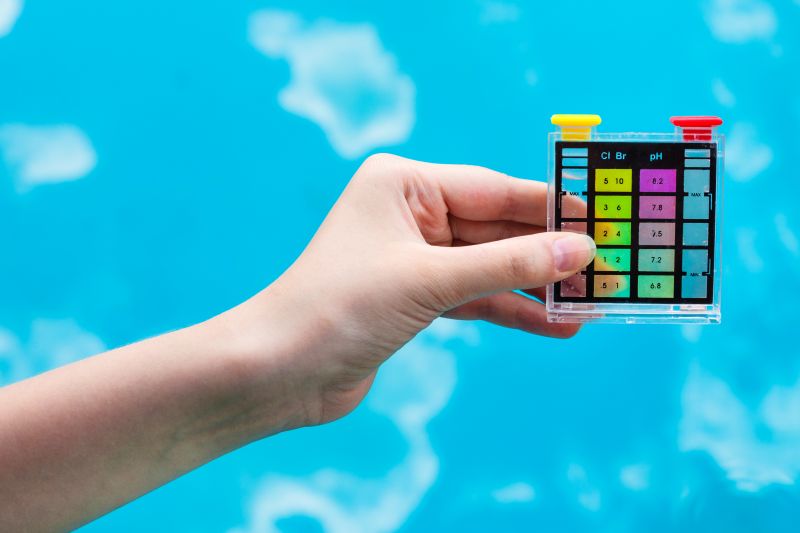
Source:aquatechutah.com
When it comes to pool maintenance, an important factor of pool care includes checking your pool’s chemical periodically to ensure healthy pH, and calcium levels, alkalinity. In the event your chemical numbers are not proper, then you must arrange pool service. However, in order to ensure your water is in good condition for swimming, it is recommended that you test the chemical levels 2-3 times per week.
The process involved in pool cleaning for most people can be very tiresome, and it also takes a lot of time. Due to the wide use of swimming pools, there is a need for frequent maintenance. You can easily exhaust yourself by checking the pool chemistry all the time and removing sediment from the water even the first time you start. You should know that the main factors of maintaining water quality in your swimming pool are chlorination, filtration, pH, calcium hardness, and total alkalinity.
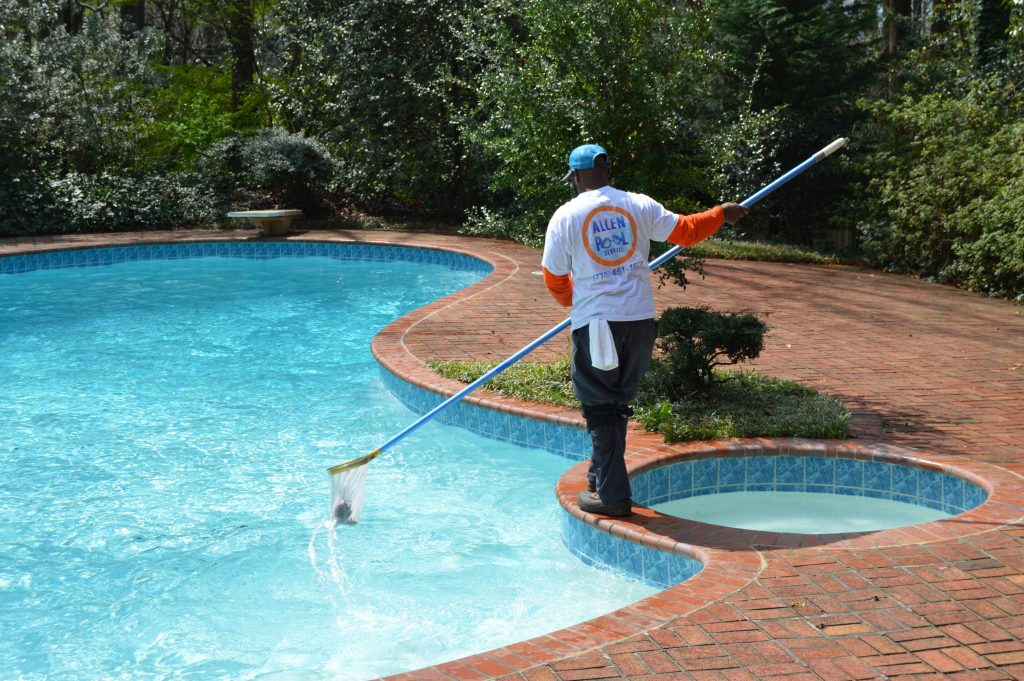
Source:allenpoolatlanta.com
It is indeed preferable and is a lot easier to do the cleaning by hiring a pool service. Unless a pool’s water is sparkling and clear, do not even think about getting in. Any other condition indicates inadequate maintenance, plus the low level of visibility itself is a serious problem.

